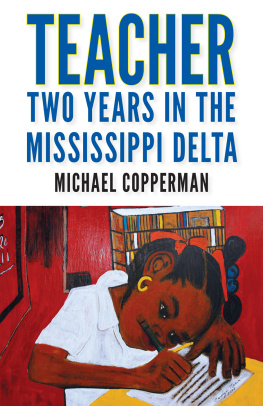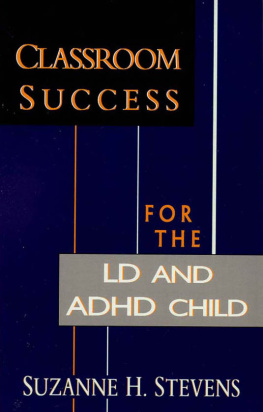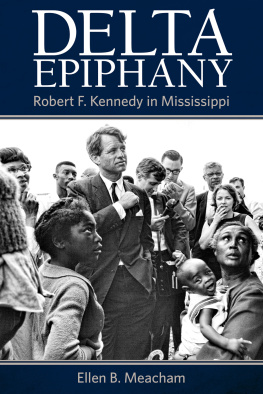
TEACHER
TEACHER
Two Years in the Mississippi Delta
Michael Copperman
University Press of MississippiJackson
www.upress.state.ms.us
The University Press of Mississippi is a member of the Association of American University Presses.
Copyright 2016 by Michael Copperman
All rights reserved
Manufactured in the United States of America
First printing 2016
Library of Congress Cataloging-in-Publication Data
Names: Copperman, Michael, author.
Title: Teacher : two years in the Mississippi Delta / Michael Copperman.
Description: Jackson : University Press of Mississippi, 2016.
Identifiers: LCCN 2015043303 (print) | LCCN 2016004196 (ebook) | ISBN 9781496805850 (cloth : alk. paper) | ISBN 9781496805867 (epub single) | ISBN 9781496805874 (epub institutional) | ISBN 9781496805881 (pdf single) | ISBN 9781496805898 (pdf institutional)
Subjects: LCSH: Education, ElementaryMississippiDelta (Region) | Education, RuralMississippiDelta (Region) | Children with social disabilitiesEducationMississippiDelta (Region) | Elementary school teachingMississippiDelta (Region) | Elementary school teachersMississippiDelta (Region) | Teach for America (Project) | Delta (Miss. : Region)Race relations. | Delta (Miss. : Region)Social conditions. | Copperman, Michael.
Classification: LCC LA314.D45 C67 2016 (print) | LCC LA314.D45 (ebook) | DDC 371.10209762dc23
LC record available at http://lccn.loc.gov/2015043303
British Library Cataloging-in-Publication Data available
There are some blows so violent
I cant answer!
Csar Vallejo, The Black Riders
CONTENTS
Past, Present, Future
My past a broken bicycle
laying on the side of the road.
My present a firecracker
that shoot light high in the sky.
My future a perfect test
in a pile of tests that the
teacher never gone grade.
Fourth-grade public school student, Mississippi
TEACHER
UNCERTAINTY
I follow the freeway from the Memphis airport, and every car seems a tall-tired, window-tinted Ford with a blond man or woman peering through my windshield, or a fender-bent, paint-chipped sedan full of blacks who meet and meet my gaze as they pass. I slip out the low end of the city, the miles of gas-station-convenience-store-fried-chicken joints, the Family Dollar and Save-a-Lot and Save-U-Mores and clubs with hand-lettered signs advertising Free Bluse, turn onto the Reverend James L Netters Parkway that becomes Highway 61, and watch buildings lose integrity, roofs, walls, and porches folding, bending, giving way. Its imminent in the roll of the tires to pitted concrete: the Delta, King Cotton, land of the lyncher, black men, the blues. Trees begin along the roadway, first a scattering between structures, then tunnels of dense, overhanging growthgreat, straight, kudzued trees, passage without exit.
Suddenly theres open plain and a girdered bank of power lines over the freeway, wires hung with arterial strands of kudzu cut from the root but left aerial. And then the sign: MississippiIts Like Coming Home. The air conditioning is cold, and out the tinted windows of the rental Chevy heat waves shiver the furrowed fields, the stalks brown with October but the bolls swollen, flights of cotton bursting free like torn feather pillows. Clouds of cotton rise behind the car, leave only an erasing white against the blue sky, and ahead only relentless asphalt and dust. I drive like this for hours, keep my eyes fixed ahead for signs Im near. Finally, through Rosewood and past, and back through the flat fields, here is the catfish plant puffing steam from twin chimneys, and then the sign, Welcome to Promise, and it all seems the same, even to the dusty Ford doing twenty under the speed limit that I come on and get caught behind, even to the drivers helmet of blond hair, and then, as he cranes his head about to see me, the stare, disbelieving and irate, as if to say, Chinaman, you know you still dont belong.
Its been six years since I drove this long road from Memphis through the fields of cotton, the depthless sky. When I left Promise that June of my twenty-fourth birthday, everything I owned in the back of my car, I didnt feel freed so much as on the lam from responsibility. Now the Delta branch of Teach For America has invited me all this way for an alumni weekend to celebrate a donation and to observe their professional development, and I couldnt turn down the chance to return. Ive continued in education, teaching low-income, first-generation, at-risk students of color at the University of Oregon in an effort to retain them, but the origins of that path lead back here. Returning, Ive thought of everything I can say about these last years teaching at-risk students of color at the university, how deserving children can make good on opportunity if its offered. That, and its an excuse to return, to see if its all still there: the town and school, the kids. Its absurd, but I have the sense that Promise-Upper couldnt have gone on without me. The meeting is scheduled in Helena, Arkansas, much later in the day, so Ive left myself the afternoon to drive to Promise.
Im nervous about interacting with the new teachers, remember being one that August, freshly graduated from college: wide eyed and callow, full of confidence in the ability to lead every last child to the promised land of educational achievement. In thinking of what to say to them, Ive talked my way through blistering condemnations of hubris and navet and unrealistic expectations. I imagine I can warn them of the true struggle ahead, of the high stakes and terrible odds, the need above all to endure. I have a good angle: am going to tell of Serenity Warner, who came to my classroom reading at a fourth-grade level and left at an eleventh-grade level, who won the Promise-Upper reading contest by a wide margin. You will alter a childs horizons, Ill declare. Change a childs future.
I come to the run of the highway strip, the Double-Quick and Conoco and Waffle House, the Grace Food Store. Black people mill about parked cars, heads down, shielding their eyes and noses from the dust of passing cars. At the next light I turn on Main, a queue of two-story colonials with wraparound porches, the magnolias with trunks like castle turrets, and only one black man now, a white-haired fellow in blue coveralls pushing a mower over the bright green lawn in front of a white house with scalloped blue trim, while a young blonde girl in a yellow sundress watches from the porch.
At Magnolia I turn and stop in front of the house I rented, a blue rancho by the black ninth-grade school. The house is empty, the windows dark: no tenant now. The white Academy football field across the street is still hemmed in by a chain-link fence topped in hoops of razor wire. When the Supreme Court ruled sixteen years after Brown v. Board that it applied even in the Delta, Triangle Countys white school board sold the field to the newly formed Academy for one dollar. White football players run drills inside the fence, while outside a dozen black kids hang loose-handed on the chain-link fence. They dont yell or jeer, just watch the players race from line to line over the immaculate grass.
I make for downtown. Sidewalks bake in the sun, but nobody walks the lonely false-fronts, the windows boarded, everything abandoned in the gutted center. Then theres the bridge across the bayou, the lowest point, the opaque green surface punctured by cypress knees, the bump of the train tracks and the black side of townFelicity Street. Old men and women stare from the shade of porches sagging to the dirt yards, the rusting roofs of shotgun shacks. A white-haired man sits in a dirt yard in an easy chair, three or four children in shorts circling about him. Two women stand on an unshaded porch, one with a hairnet gesturing expansively, the other nodding in affirmation. A group of teenage boys swagger along the side of the road, the baggy folds of their pants pooling above impossibly white shoes, their heads wrapped with handkerchiefs or shaved bald so you can see the contours of their skulls. Trailing behind them, three girls of the same age sway jauntily along, legs long and muscular and overexposed, the girl in the middle pushing a baby stroller, the baby hidden from sight. And then, at streets end, the schools familiar sign mounted to the razor-wire fence: Promise-Upper Elementary, declared in blue and black, a smiling koala ascending a branch that ends abruptly near the top of the sign.
Next page





